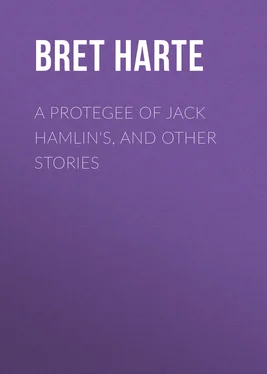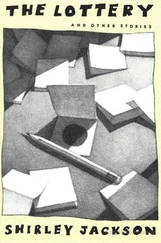Bret Harte - A Protegee of Jack Hamlin's, and Other Stories
Здесь есть возможность читать онлайн «Bret Harte - A Protegee of Jack Hamlin's, and Other Stories» — ознакомительный отрывок электронной книги совершенно бесплатно, а после прочтения отрывка купить полную версию. В некоторых случаях можно слушать аудио, скачать через торрент в формате fb2 и присутствует краткое содержание. Издательство: Иностранный паблик, Жанр: foreign_sf, literature_19, foreign_antique, foreign_prose, на английском языке. Описание произведения, (предисловие) а так же отзывы посетителей доступны на портале библиотеки ЛибКат.
- Название:A Protegee of Jack Hamlin's, and Other Stories
- Автор:
- Издательство:Иностранный паблик
- Жанр:
- Год:неизвестен
- ISBN:нет данных
- Рейтинг книги:4 / 5. Голосов: 1
-
Избранное:Добавить в избранное
- Отзывы:
-
Ваша оценка:
- 80
- 1
- 2
- 3
- 4
- 5
A Protegee of Jack Hamlin's, and Other Stories: краткое содержание, описание и аннотация
Предлагаем к чтению аннотацию, описание, краткое содержание или предисловие (зависит от того, что написал сам автор книги «A Protegee of Jack Hamlin's, and Other Stories»). Если вы не нашли необходимую информацию о книге — напишите в комментариях, мы постараемся отыскать её.
A Protegee of Jack Hamlin's, and Other Stories — читать онлайн ознакомительный отрывок
Ниже представлен текст книги, разбитый по страницам. Система сохранения места последней прочитанной страницы, позволяет с удобством читать онлайн бесплатно книгу «A Protegee of Jack Hamlin's, and Other Stories», без необходимости каждый раз заново искать на чём Вы остановились. Поставьте закладку, и сможете в любой момент перейти на страницу, на которой закончили чтение.
Интервал:
Закладка:
“The simple fact is that our ruse was successful,” said an outside passenger. “They waited to see our lights on the ridge, and, not seeing them, missed us until we had passed. That’s my opinion.”
“You ain’t puttin’ any price on that opinion, air ye?” inquired Bill politely.
“No.”
“‘Cos thar’s a comic paper in ‘Frisco pays for them things, and I’ve seen worse things in it.”
“Come off, Bill,” retorted the passenger, slightly nettled by the tittering of his companions. “Then what did you put out the lights for?”
“Well,” returned Bill grimly, “it mout have been because I didn’t keer to hev you chaps blazin’ away at the first bush you THOUGHT you saw move in your skeer, and bringin’ down their fire on us.”
The explanation, though unsatisfactory, was by no means an improbable one, and we thought it better to accept it with a laugh. Bill, however, resumed his abstracted manner.
“Who got in at the Summit?” he at last asked abruptly of the Expressman.
“Derrick and Simpson of Cold Spring, and one of the ‘Excelsior’ boys,” responded the Expressman.
“And that Pike County girl from Dow’s Flat, with her bundles. Don’t forget her,” added the outside passenger ironically.
“Does anybody here know her?” continued Bill, ignoring the irony.
“You’d better ask Judge Thompson; he was mighty attentive to her; gettin’ her a seat by the off window, and lookin’ after her bundles and things.”
“Gettin’ her a seat by the WINDOW?” repeated Bill.
“Yes, she wanted to see everything, and wasn’t afraid of the shooting.”
“Yes,” broke in a third passenger, “and he was so d–d civil that when she dropped her ring in the straw, he struck a match agin all your rules, you know, and held it for her to find it. And it was just as we were crossin’ through the brush, too. I saw the hull thing through the window, for I was hanging over the wheels with my gun ready for action. And it wasn’t no fault of Judge Thompson’s if his d–d foolishness hadn’t shown us up, and got us a shot from the gang.”
Bill gave a short grunt, but drove steadily on without further comment or even turning his eyes to the speaker.
We were now not more than a mile from the station at the crossroads where we were to change horses. The lights already glimmered in the distance, and there was a faint suggestion of the coming dawn on the summits of the ridge to the west. We had plunged into a belt of timber, when suddenly a horseman emerged at a sharp canter from a trail that seemed to be parallel with our own. We were all slightly startled; Yuba Bill alone preserving his moody calm.
“Hullo!” he said.
The stranger wheeled to our side as Bill slackened his speed. He seemed to be a “packer” or freight muleteer.
“Ye didn’t get ‘held up’ on the Divide?” continued Bill cheerfully.
“No,” returned the packer, with a laugh; “I don’t carry treasure. But I see you’re all right, too. I saw you crossin’ over Galloper’s.”
“SAW us?” said Bill sharply. “We had our lights out.”
“Yes, but there was suthin’ white—a handkerchief or woman’s veil, I reckon—hangin’ from the window. It was only a movin’ spot agin the hillside, but ez I was lookin’ out for ye I knew it was you by that. Good-night!”
He cantered away. We tried to look at each other’s faces, and at Bill’s expression in the darkness, but he neither spoke nor stirred until he threw down the reins when we stopped before the station. The passengers quickly descended from the roof; the Expressman was about to follow, but Bill plucked his sleeve.
“I’m goin’ to take a look over this yer stage and these yer passengers with ye, afore we start.”
“Why, what’s up?”
“Well,” said Bill, slowly disengaging himself from one of his enormous gloves, “when we waltzed down into the brush up there I saw a man, ez plain ez I see you, rise up from it. I thought our time had come and the band was goin’ to play, when he sorter drew back, made a sign, and we just scooted past him.”
“Well?”
“Well,” said Bill, “it means that this yer coach was PASSED THROUGH FREE to-night.”
“You don’t object to THAT—surely? I think we were deucedly lucky.”
Bill slowly drew off his other glove. “I’ve been riskin’ my everlastin’ life on this d–d line three times a week,” he said with mock humility, “and I’m allus thankful for small mercies. BUT,” he added grimly, “when it comes down to being passed free by some pal of a hoss thief, and thet called a speshal Providence, I AIN’T IN IT! No, sir, I ain’t in it!”
II
It was with mixed emotions that the passengers heard that a delay of fifteen minutes to tighten certain screw-bolts had been ordered by the autocratic Bill. Some were anxious to get their breakfast at Sugar Pine, but others were not averse to linger for the daylight that promised greater safety on the road. The Expressman, knowing the real cause of Bill’s delay, was nevertheless at a loss to understand the object of it. The passengers were all well known; any idea of complicity with the road agents was wild and impossible, and, even if there was a confederate of the gang among them, he would have been more likely to precipitate a robbery than to check it. Again, the discovery of such a confederate—to whom they clearly owed their safety—and his arrest would have been quite against the Californian sense of justice, if not actually illegal. It seemed evident that Bill’s quixotic sense of honor was leading him astray.
The station consisted of a stable, a wagon shed, and a building containing three rooms. The first was fitted up with “bunks” or sleeping berths for the employees; the second was the kitchen; and the third and larger apartment was dining-room or sitting-room, and was used as general waiting-room for the passengers. It was not a refreshment station, and there was no “bar.” But a mysterious command from the omnipotent Bill produced a demijohn of whiskey, with which he hospitably treated the company. The seductive influence of the liquor loosened the tongue of the gallant Judge Thompson. He admitted to having struck a match to enable the fair Pike Countian to find her ring, which, however, proved to have fallen in her lap. She was “a fine, healthy young woman—a type of the Far West, sir; in fact, quite a prairie blossom! yet simple and guileless as a child.” She was on her way to Marysville, he believed, “although she expected to meet friends—a friend, in fact—later on.” It was her first visit to a large town—in fact, any civilized centre—since she crossed the plains three years ago. Her girlish curiosity was quite touching, and her innocence irresistible. In fact, in a country whose tendency was to produce “frivolity and forwardness in young girls, he found her a most interesting young person.” She was even then out in the stable-yard watching the horses being harnessed, “preferring to indulge a pardonable healthy young curiosity than to listen to the empty compliments of the younger passengers.”
The figure which Bill saw thus engaged, without being otherwise distinguished, certainly seemed to justify the Judge’s opinion. She appeared to be a well-matured country girl, whose frank gray eyes and large laughing mouth expressed a wholesome and abiding gratification in her life and surroundings. She was watching the replacing of luggage in the boot. A little feminine start, as one of her own parcels was thrown somewhat roughly on the roof, gave Bill his opportunity. “Now there,” he growled to the helper, “ye ain’t carting stone! Look out, will yer! Some of your things, miss?” he added, with gruff courtesy, turning to her. “These yer trunks, for instance?”
Читать дальшеИнтервал:
Закладка:
Похожие книги на «A Protegee of Jack Hamlin's, and Other Stories»
Представляем Вашему вниманию похожие книги на «A Protegee of Jack Hamlin's, and Other Stories» списком для выбора. Мы отобрали схожую по названию и смыслу литературу в надежде предоставить читателям больше вариантов отыскать новые, интересные, ещё непрочитанные произведения.
Обсуждение, отзывы о книге «A Protegee of Jack Hamlin's, and Other Stories» и просто собственные мнения читателей. Оставьте ваши комментарии, напишите, что Вы думаете о произведении, его смысле или главных героях. Укажите что конкретно понравилось, а что нет, и почему Вы так считаете.











